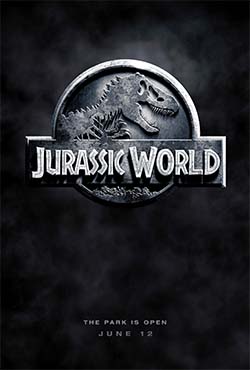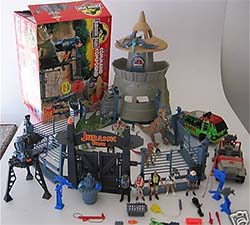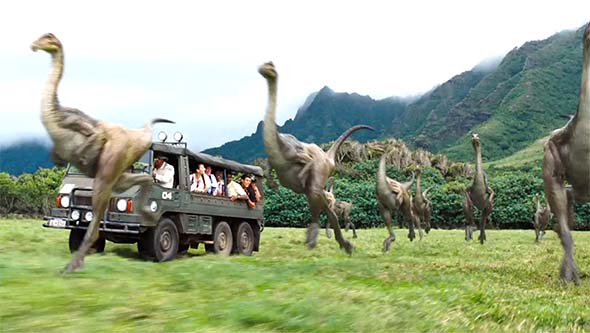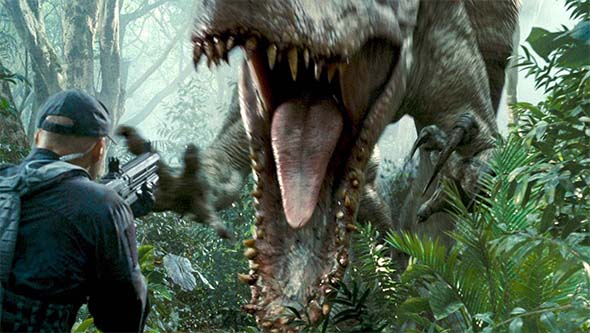
Jurassic Park is one of my earliest and strongest movie memories. I think I saw it at least four times in theaters when I was a kid. Even at that age, I rarely ever saw a movie more than once in a theater. Probably because I couldn't convince my parents to take me more than once, so if I wanted to go again, I'd have to go with a friend or a cousin. But that movie was good enough that I think even my mom and dad went multiple times.
I had a bunch of the Jurassic Park toys, including the character action figures, the large dinosaurs, the jeep, and even the compound playset with the fence and the gate. It was a very monumental movie in my youth that also shaped my perception of movies going forward, as well as helping to spark my interest in science. The awe and wonder of it captured my imagination and held very tightly for a very long time. Its scenes, images, dialogue, and music have all stuck with me to this day.
Perhaps because of this, my favorite parts of the newly-released Jurassic World were the brief scenes of the kids exploring the theme park. I enjoyed the brief clips of the petting zoo where kids fed the baby dinosaurs and rode on the backs of baby triceratops. I especially liked the little playground set where the kids would pretend to dig up dinosaur fossils. Seeing the kids on screen enjoying the awe and wonder of the animals sent me on a nostalgia trip to 20 years ago. The idea of people interacting with these animals is still just as captivating as it was then. There was a very addictive, light-hearted sense of joy and energy throughout these short-lived segments.

I had many Jurassic Park toys when I was a kid.
Even a more depressing mid-movie scene in which Chris Pratt and Bryce Dallas-Howard try to comfort a dying dinosaur was a touching moment that I really liked. It reminded me of the triceratops scene from the first movie, and the dinosaur was surprisingly expressive.
I did think it was weird that the director chose to play John Williams' trademark Jurassic Park theme as fanfare for what was effectively just a scenic helicopter landing. I get that it was an homage to the first movie, but I feel that the first movie built up to the arrival in the park, and paid off the fanfare with the classic money shot of the brachiosaur grazing in the open field. In Jurassic World, it just kind of felt like going through the motions. Imitation for imitation's sake.
In any case, these fun scenes with the dinosaurs is definitely not the point of the movie, and these sorts of scenes and moments get shoved to the side in order to make room for the film's main plot.

My favorite scenes were the ones of people enjoying the park.
Science gone wrong - the issue of intent
I was skeptical about Jurassic World from the very first trailers. I worried that it would surely miss the point.
Michael Crichton's novels and the first movie weren't about "science gone amok"; it wasn't a Frankenstein story about mad scientists creating monsters. It was about well-intentioned scientists who underestimated the complexities of nature. The point wasn't supposed to be that "science is bad" or "science is dangerous"; the point was that nature is beyond human powers to control, and that it is hubris on our parts to think that we can control it. From what I've read of Crichton's other works, this is the predominant theme of most of his writings.
Yes, there was a sub-plot about an evil corporation wanting to use the science for financial gain. But that theme was always secondary to the greater theme and message of "just let nature be, and stop trying to control it.".
Jurassic World's plot about a corporation genetically engineering a new dinosaur definitely falls firmly into the Frankenstein category, and completely misses the point and message of the original book and movie. It also makes very little sense. I understand the company's desire to create new attractions to entice visitors. Creating a new dinosaur from wholecloth doesn't seem to be the way to do that.
The whole appeal of Jurassic Park is supposed to be to show these natural animals as they existed millions of years ago - or at least as close as possible. It was a peek into the past. Indominus Rex isn't a part of the past. Why would anyone who wants to see dinosaurs ever want to see an exhibit of a fake dinosaur? Were they going to put its cage right next to Godzilla in the "Bullshit" wing of the park?
At this point, it's not a zoo anymore. It's a freakshow.
This isn't an ethical question. It's an economic question: is there really a market for Indominus Rex?

Indominus Rex doesn't belong in a zoo. It belongs in a freakshow.
If they're really worried that the appeal of dinosaurs is wearing thin, then why not branch out beyond just dinosaurs? Why not start by resurrecting the woolly mammoth, or sabertooth tiger, or megoladon? Those seem like much more reasonable next steps that don't require making stuff up. So I had a really hard time just buying into the core concept of the movie. In the end, it's not a dinosaur movie; it's just another sci-fi monster movie.
Talking to the audience
It appears that some of the writers understood that some audiences would feel this way, and they tried to head that criticism off with some explicit dialogue. There is a scene in the movie in which one of the geneticists who created Indominus Rex is confronted and asked "Why did you do this?" He responds by saying that this is what they've always done; they've always spliced the dinosaurs' DNA with that of other animals.
Touché Jurassic World writers. Touché. I felt like this line was aimed directly at me, and it's a good point. After all, the dinosaurs in the original Jurassic Park were also modified in order to fill in gaps in their genomes. The difference though, is that the original Jurassic Park still sought to recreate the dinosaurs as closely as they possibly could to the original, real animal, and giving them to power to reproduce was an unforeseen accident. In Jurassic World, they're deliberately making a genetically-engineered monster.
This line didn't quite show the same level of subversive self-awareness as Scotty's dialogue in Star Trek Into Darkness. Scotty in that movie felt more like an avatar for all the angry Star Trek nerds who didn't like the new movie for not being enough about exploration. It was apologetic; like some writers' way of saying "We get you, and we're sorry." The geneticist's line in Jurassic World felt more defensive; "don't blame us, this is what the movie's always been about." No, it wasn't.
And that doesn't even get into the silly, stupid stuff that actually results in the movie's primary drama. Like the idiotic idea of raising the animal in confined, solitary isolation. Or not making the handlers, technicians, and engineers responsible for building its paddock aware of the animal's expected - or potential - capabilities. Were there not controls in place to prevent a such a ridiculous animal from being created to begin with? Like, didn't someone at an executive level have to review the animals' genome and sign off on it? Are we supposed to believe that Ingen and the geneticist deliberately conspired to use the Indominus Rex to shut down the park? Or was Ingen solely interested in the raptors, and Indominus just offered a convenient opportunity?
The military sub-contractor sub-plot seemed to be pulled straight from Alien, only with a lamer villain.
The subplot about the military contractors wanting to use the dinosaurs as a weapon seemed to be pulled straight out of Alien. The Ingen military contractor "villain" character was a little flat and came off as a silly comic-book-caricature villain (almost as bad as the villain in Avatar). It certainly didn't help that he was both a comic relief character, and the primary human antagonist. It just didn't work for me.
The one thing that I did like about Indominus Rex was trying to piece together what other animals its DNA was pulled from. Like, for example, seeing it dislocate its jaw to try to eat the gyrosphere, concluding that it must be part snake, and then having that suspicion validated by seeing a snake in the secret research lab later. So that was a fun little game that the movie let the viewer play.
The constant jabs at consumerism, product-placement, the comment about "Pepsisaurus", and so on were all on point. But I wasn't completely convinced that the movie was as self-aware as it seemed.
In fact, I'd have been more willing to buy into the anti-consumerism meta commentary about the focus groups wanting a "bigger and better" dinosaur, if the film hadn't shoe-horned in this silly conspiratorial sub-plot. This seemed to subvert the "focus group dinosaur" theme by implying that Indominus wasn't the result of audiences wanted "bigger, faster, meaner dinosaurs", but rather that it was the result of a conspiracy between Ingen and the geneticist to create a weaponized dinosaur.
It was ironic to see so much lip-service being paid to anti-corporatization themes in a movie that had rampant product-placement (even though that product placement was mostly justified) and didn't show the courage to take enough chances. So the movie is the very thing that it was critiquing.
The rest of the characters worked well enough for me, and Bryce Dallas-Howard's number-oriented personality and lack of interest in her family basically made her an avatar for the themes of the increasingly impersonal, corporatized business culture of the theme park. In fact, familial bonds seems to be what this movie is supposed to be all about. Since the writers didn't want to deal with ethics or political statements beyond some lip service, the movie is a much more personal film about the strength of family and cooperation as opposed to individuality. And it works well on that level, even if it does feel cliché and clumsy at times.
From parable to allegory
The sad thing (for me) is that at a fundamental level, the idea of the park finally opening to the public actually had plenty of potential without needing the Frankensaurus Rex plot. The original Jurassic Park movie dealt heavily with the ethics and implications of bringing dinosaurs back. Do we have the right to create these animals? Is it a good idea? Shouldn't we just let it be? Those themes were handled very well in the previous movies, so I wouldn't want a new movie to retread over them again.
So where could the series go from there? The dinosaurs are here. We made them. Now the question shifts to "How do we take care of them?". To this movie's credit, that was exactly the theme that it tried to convey - at first, anyway. It does put forward some real ethical questions that parallel many of the ethical concerns with real life zoos and similar parks. The Jurassic World park that is presented in this movie is basically a stand-in for the real life Sea World. It makes legitimate commentary regarding the treatment of the animals now that they are here, rather than with the ethical concerns of their creation.
Jurassic World is an allegorical stand-in for the real-life Sea World.
It was a good idea to take the original parable of Jurassic Park (with its warnings about the dangers of overly-ambitious science) and change it to be a allegory for real-world issues. It was also a good idea to focus heavily on an anti-consumerism message. So I have to give the creators kudos for these excellent decisions. If only the movie had stuck with it and gone deeper into some of the more complex issues of DNA-patenting and the use of trained animals as military weapons. I'm not asking it to take a political stance, just to make an effort to bring these sorts of issues into the public forum. It would have added a lot more intellectual depth to the simple, family and relationship-centered plot.
But Hollywood producers obviously didn't want to make Free Willy with dinosaurs, so these well-intentioned themes fall away completely in the second half of the movie as the whole thing degrades into a fun, but very predictable, very safe, and very forgettable Hollywood monster flick. It was fun, mostly well-constructed, and it had some clever and touching scenes. But in six months, I probably won't remember a single scene or character from Jurassic World, while Jurassic Park will still stand tall and proud as a cinematic masterpiece.